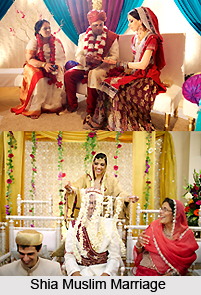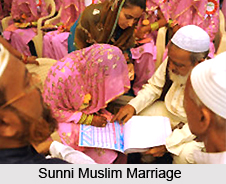 Indian Majority Act, 1875 do not govern the Muslim marriage but the Muslim law itself controls it. According to Muslim Law, Marriage or `Nikah` as the Muslims call the nuptial ceremony is an agreement underlying a permanent relationship based on mutual approval.
Indian Majority Act, 1875 do not govern the Muslim marriage but the Muslim law itself controls it. According to Muslim Law, Marriage or `Nikah` as the Muslims call the nuptial ceremony is an agreement underlying a permanent relationship based on mutual approval.
Essential Features of Muslim Nikah
•A Muslim marriage requires proposal called the Ijab from one party and acceptance or Qubul from the other as is necessary for a contract.
•There can be no marriage except for the free consent and such consent should not be obtained by means of compulsion, deception or unjustified influence.
•Just as in case of agreement, entered by a guardian, on attaining majority, so can a marriage contract in Muslim Law, be set aside by a minor on attaining the age of puberty.
•The parties to a Muslim marriage may enter into any ante-nuptial or post-nuptial agreement, which is enforceable by law, provided it is sensible and not opposed to the policy of Islam. In the case with a contract the same policies are folowed.
•The terms of a marriage contract may also be changed within the legal limitations to suit individual cases.
•Although discouraged both by the holy Quran and Hadith, yet like any other contract, there is also provision for the violation of marriage contract.
 Requirements of Muslim Nikah
Requirements of Muslim Nikah
The solemnization of a Muslim marriage needs strict following of certain rules and regulations. They are called the basic fundamentals of a valid marriage. If any of these requirements is not fulfilled the marriage becomes either void or irregular, as the case may be.
The essentials of Muslim marriage are as follows:
•Proposal and Acceptance
•Competent Parties
•No legal Disability
Absolute Prohibition
There is absolute prohibition of marriage in case or relationship of consanguinity. In this case the situation is such that the relationship has grown up of the person through his/her father or mother on the ascending side, or through his or her own on the descending side.
Marriage among the persons associated by affinity, such as through the wife it is not permitted. Marriage with foster mother and other related through such foster mother is also not permitted.
Relative Prohibitions
•Unlawful union
•Marrying a fifth wife
•Marrying a woman undergoing iddat
•Marrying a non-Muslim
•Absence of proper witnesses
•Woman going for a second marriage even after the existence of the first marriage.
•Marrying pregnant women
•Marrying during pilgrimage
•Marrying own divorced wife
Procedure for Muslim Nikah
•According to Muslim Law it is necessary that a man or someone on his behalf and the woman or someone on her behalf should give their consent to the marriage at one meeting and two adult witnesses should witness the agreement.
•The words meaning proposal and acceptance must be spoken in each other`s presence or in the presence of their agents, who are called Vakils or Qazi.
•The other circumstance for a valid marriage is that the contract must be completed at one meeting. A proposal made at one meeting and an acceptance at another meeting does not constitute a valid marriage.
•There must be exchange of views between offer and acceptance. The acceptance must not be restricted.
•Under the Sunni Law, the proposal and acceptance must be made in presence of two males or one male and two female witnesses who are sane, adult and Muslim. Under Shia Law, witnesses are not necessary at the time of marriage. They are required at the time of dissolution of marriage.
•The parties arranging the marriage must be giving their free will and consent.
•Polygamy - The Muslim law permits a Muslim man to have four wives, provided he treats all of them equally.
Dower or Mahr - It is an obligation imposed upon the husband at the time of the marriage as a mark of reverence to the wife. The wife can receive it by instituting an action as if it was a debt due to her.
Divorce - Marriage under Islam is only a civil agreement and not a sacrament. A husband can leave his wife without any reasons or merely by pronouncing the word "Talak" thrice. However, for a Muslim woman to obtain divorce certain circumstances are necessary. The husband and the wife with mutual agreement can also put an end to the marriage.
Like Hindu law, followers of Islam have their own personal law, which states that Nikaah or marriage is a contract, may be permanent or temporary, and permits a man four wives if he treats all of them equally. There should be a proposal or `offer,` made by or on behalf of one of the two parties;
The Muslim marriage law also states that to have a valid marriage under the Muslim law, if a person is of sound mind, normal and has attained puberty at the age of 15 his or her marriage cannot be performed without his or her consent. There are certain prohibited relationships, whose marriage is considered void. Like mother and son, grandmother and grandson, uncle and niece, brother and sister and nephew and aunt.
• An `acceptance` of such proposal or `offer` by or on behalf of the other party;
• The `offer` and `acceptance,` both, must be expressed in the same meeting. There is no prescribed form for proposal and acceptance. However, a proposal, made at one meeting and an acceptance, made at another meeting, will not constitute a valid marriage;
• The offer and acceptance must be made in the presence of two male witnesses, or one male and two female witnesses, who must be adult Mohammedans of sound mind; iv. A marriage, contracted without witnesses, is not void but is considered irregular. Such irregularity can be cured by consummation.
However, according to Shia law, the presence of witnesses is not necessary in any matter.
Muslim Marriage Act 1939 Muslim Marriage Act also has a provision for separation under the name of dissolution of Marriage act, 1939. Both the parties to the marriage contract have an opinion for divorce, but the husband`s right in this respect is much greater than that of the wife. In case of divorce a husband can leave his wife without any reasons merely by pronouncing the word "Talak" thrice. Like in Hindu marriage act, divorce can also take place due to mutual agreement between the husband and the wife, which is known as Mubarat. Khula is another way of ending a Muslim marriage, which is a form of divorce with the consent and at the initiative of the wife. The wife gives or agrees to give a consideration to the husband for her release from the marriage tie. In this form relieving the husband from payment of mahr to the wife may be a consideration.
A woman married under Muslim law shall be entitled to obtain a decree for the dissolution of her marriage on any one or more of the following grounds, namely:
(i) That the whereabouts of the husband have not been known for a period of four years;
(ii) That the husband has neglected or has failed to provide for her maintenance for a period of two years;
(iii) That the husband has been sentenced to imprisonment for a period of seven years or upwards;
(iv) That the husband has failed to perform, without reasonable cause, his marital obligations for a period of three years.
(v) That the husband was impotent at the time of the marriage and continues to be so;
(vi) That the husband has been insane for a period of two years or is suffering from leprosy or a virulent venereal disease.
(vii) That she, having been given in marriage by her father or other guardian before she attained the age of fifteen years, repudiated the marriage before attaining the age of eighteen years.
In case of the dissolution of marriage by any means discussed above the man and the woman can remarry immediately. In fact, unlike in a Hindu marriage, Muslim widow is encouraged to be remarried and that`s a responsibility of the Muslim community.
More on Indian Marriage Acts
More on Indian Wedding Accessories
More on Indian Religious Weddings
More on Types of Marriages
See also
 Indian Majority Act, 1875 do not govern the Muslim marriage but the Muslim law itself controls it. According to Muslim Law, Marriage or `Nikah` as the Muslims call the nuptial ceremony is an agreement underlying a permanent relationship based on mutual approval.
Indian Majority Act, 1875 do not govern the Muslim marriage but the Muslim law itself controls it. According to Muslim Law, Marriage or `Nikah` as the Muslims call the nuptial ceremony is an agreement underlying a permanent relationship based on mutual approval.
 Requirements of Muslim Nikah
Requirements of Muslim Nikah

















